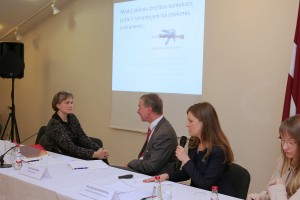While taking part in the Conference of December 10, organized by the Office of the Ombudsman, Ieva Dzelme-Romanovska, communications specialist at the Centre for East European Policy Studies (CEEPS), stressed that the media would have to be viewed in security context because they could be used as a tool of influence.
One of the days of this year’s Ombudsman’s Conference, hold annually, was dedicated to the themes of independence of the media and pluralism of information. The CEEPS’ representative was invited to express her opinion on the issues of third parties impact on the information space in Latvia, the ways how to identify separate countries’ hostile propaganda and how to confine it, as well as the risks resulting from existence of two-language media space in the country.
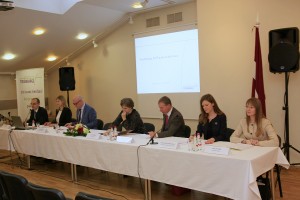
According to Dzelme-Romanovska, the use of the media with the aim to ensure public’s support for Russia’s foreign policy initiatives is one of Russia’s objectives. With the help of the media content, the Russian language audience in Latvia is mobilized in line with official Russia’s position in order to achieve people’s actions in Russia’s interests at some decisive moments. Russia’s media have cultivated the sense of oppositionist diaspora in the Russian speaking part of Latvia’s population – Russian speakers’ community is positioned as an independent and isolated from Latvian people actor.
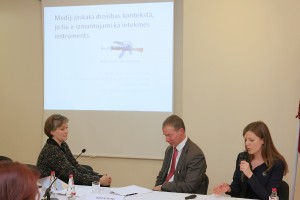
A recent study, carried out by CEEPS, on Russian public diplomacy in Latvia indicates that, unfortunately, also local Russian language media tend to offer the content similar to that of Russia’s media. They regularly present stories on seeming discrimination of minorities, rewriting of history, as well as Latvian political elite’s seeming inability to administer the country is underlined.
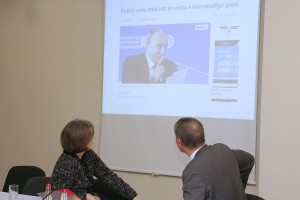
The discourse of both Russia’s media and the Russian language media in Latvia is oriented to confrontation with the ruling Latvian political elite, and it supports official Russia’s, not Latvia’s, values and geopolitical priorities. Referring to the data of the CEEPS’ study, Dzelme-Romanovska mentioned that thereby a part of Latvia citizens, the consumers of only the Russian language media, consequently live in the parallel reality designed by Russia. She emphasized the necessity to prevent the situation when the other country develops a circle of its supporters out of a part of our country’s public. Especially if one takes into consideration the differences between our country’s values and geopolitical orientation, and those of the other country.
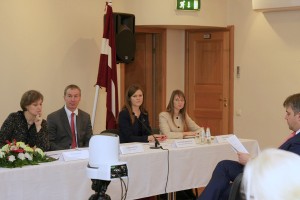
In case the other country is allowed to implement purposefully its foreign policy, shaping and cultivating discontent and protest against our country and its strategic course in a part of the society, it will be no wonder if the respective consequences appear some day. For example, legitimizing in Russia and partly Ukraine of the annexation of Crimea was impossible without the Kremlin’s control of the leading Russian media and popularizing of specific messages on Ukraine by the major Russian media over the period of already several years. Such conclusion was made by the authors of the CEEPS’ research “Russia’s Information Campaign against Ukraine: from Vilnius Summit to Crimean Referendum”, ordered by the NATO Strategic Communications Centre of Excellence.
The CEEPS’ representative offered the following measures for improvement of the situation:
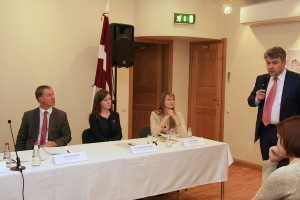
In the long run, improvement of the media use proficiency and critical way of thinking of the public is necessary both during the educational process at schools and post-school period.
Since we are not able to influence the processes in Russia and Russian media, the media in Latvia should at least act according to the standards of quality journalism. We often hear the pretext that the media have to be profitable, so they have to please their audience, and, if the audience has accustomed itself to the content of Russian propaganda, something similar to that has to be offered. The opinion is regularly expressed, too, that the content of the Russian language media in Latvia is already quite acceptable. In case the aforementioned studies, and the ones which have not been mentioned, are insufficient, it is obviously necessary to develop some more comparative research in media content in order the quantity of evidences of one-sidedly presented information is enough.
The media professional organizations should follow the compliance of the media content with the principles of good journalism. For example, the Association of Latvian Journalists.
The assessment and control functions of the National Electronic Mass Media Council are also significant. The problem still exists regarding i-net portals, the content of which being presently supervised by nobody. Media Centre of Excellence may undertake monitoring/quality control of the media.
According to the CEEPS’ representative, as it is very important to prevent disappearance from the public agenda of the significant issue of the impact of media in the state security context, the CEEPS will continue discussion of it and maintain its timeliness.
Egils Levits, Judge of the European Court of Justice, also pointed at Russia’s influence in the media space of Latvia and indicated that it is necessary to monitor the media content. He mentioned that a media monitoring unit might be set up in Latvia, tasked with systematic examination of the media content, highlighting the mistakes, assessment and ethic problems, and the other shortcomings. The currently existing lack of practically any criticism toward the media has a destructive impact on the media quality. Meanwhile Russia makes systematic attempts to take over the content of Latvian discourse space, impose its world outlook on it, thereby causing changes in Latvia’s political orientation and basic values. According to Levits, it is the matter of Latvia’s security and sovereignty which must not be ignored.
Ineta Ziemele, judge at the Constitutional Court of Latvia, explained that presently a too large percentage of Russia’s media exists in the choice of the media available in Latvia, thereby the information space in Latvia does not meet the norms of Satversme (Constitution of Latvia), and such situation has to be changed. A greater pluralism of information, similar to that in some other European Union member states, is necessary. And we should deny the pretext that the sphere of media, same as the other kinds of commercial activities, has to follow only the market principles and demand of the audience. Ziemele stressed that, similar to the other performers of commercial activities, also the commercial media act according to the law of Latvia, thereby the state can assign concrete tasks to them. The judge emphasized the necessity to revise the long ago designed and incorrect Electronic Mass Media Law in order to include clear definitions of state policy positioning, as well as media regulation, supervision and responsibility issues in it.
